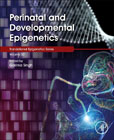
Perinatal and Developmental Epigenetics, Volume 32, a new volume in the Translational Epigenetics series, provides a thorough overview of epigenetics in the early developmental and perinatal stages, illuminating pathways for drug discovery and clinical advances. Here, over 25 international researchers examine recent steps forward in our understanding of epigenetic programming during perinatal and early development. The book opens with an in-depth introduction to known and newly discovered epigenetic marks and how they regulate various cellular processes. Later sections examine various prenatal and perinatal environmental experiences and their ability to derail the normal developmental trajectory via epigenetic reprogramming. Insights and suggestions for future research illuminate approaches for identifying individual disease susceptibility. Concluding chapters highlight preventative and targeted therapeutic pathways to improve quality of life into adulthood. Examines disease onset stemming from epigenetic changes during the perinatal periods Features contributions from international experts in the field, including basic biology, disease research and drug discovery Offers intervention strategies to mitigate adverse developmental programming to improve health outcomes INDICE: Section I: The ever-growing complexity of epigenetic regulation of gene expression1. Epigenetic regulation of gene expression: An overview of classical and recently discovered novel players: -Role of DNA methylation, Role of Histone modifications, Role of non-coding RNAs2. Epigenetic regulation of transposable elements and their impact on developmental processes3. Epigenetic regulation of germ cells4. Epigenetic regulation of cis-regulatory elements and transcription factors during development5. Genomic imprinting and developmental physiology: Intrauterine growth and postnatal period6. Metabolic regulation of epigenetic processes7. Role of RNA epigenetics in developmentSection II: Epigenetic programming of the placenta regulates short-term and long-term health outcomes8. Epigenetic regulation of placental function9. Role of placenta in developmental programming of sex-specific adult outcomes10. Epigenetic changes induced by Assisted Reproductive Technologies (ART) in the placenta and its effect on developmental outcomesSection III: Epigenetics, hormones, sex and developmental programming11. Epigenetic and hormone interaction and effect on gene regulation during prenatal and early postnatal life12. Role of epigenetics in shaping the sex difference in immune function during development13. Role of epigenetics in shaping sex differences in brain development and behavior14. Role of epigenetics in shaping sex differences in heart development and later life cardiovascular disease riskSection IV: Epigenetic programming by adverse perinatal influences15. Early life endocrine disruptors exposure and epigenetic programming16. Early life stress exposure and epigenetic programming17. Early life nutrition and epigenetic programming18. Early life air pollution exposure and epigenetic programming19. Early life substance abuse and epigenetic programmingSection V: Advancing translational epigenetic research21. Modelling early life adversity in the laboratory -: Animal models, their advantages and challenges in extrapolating findings from animal studies to humans22. Clinical evidence of developmental programming due to early life exposures and long-term effects: Implications for public health23. Phenotypic plasticity: Adaptive vs Maladaptive response and epigenetic changes24. Epigenomics: A road to genome-wide characterization of epigenetic changes during development and identifying future individuals at risk of disease susceptibilitySection VI: Pharmacological and non-pharmacological approaches to reprogram the developmental programming to improve the health outcomes26. Epigenetic signatures as biomarkers of early life experiences27. Environmental enrichment and its effect on modifying the epigenetic changes induced by early life adversity28. Dietary targeting of epigenome and its effect on early life adverse influences29. Early postnatal maternal care and epigenetic programming of HPA axis activity30. Emerging field of epigenetic editing: Implication for translational purposes for diseases with developmental origin and sex bias
- ISBN: 978-0-12-821785-6
- Editorial: Academic Press
- Encuadernacion: Rústica
- Páginas: 432
- Fecha Publicación: 01/09/2022
- Nº Volúmenes: 1
- Idioma: Inglés
